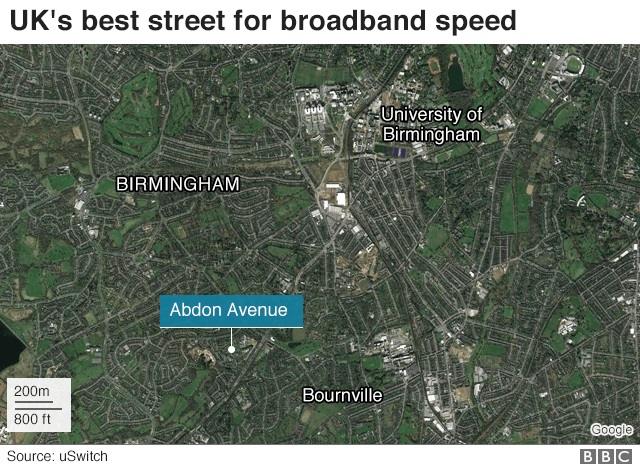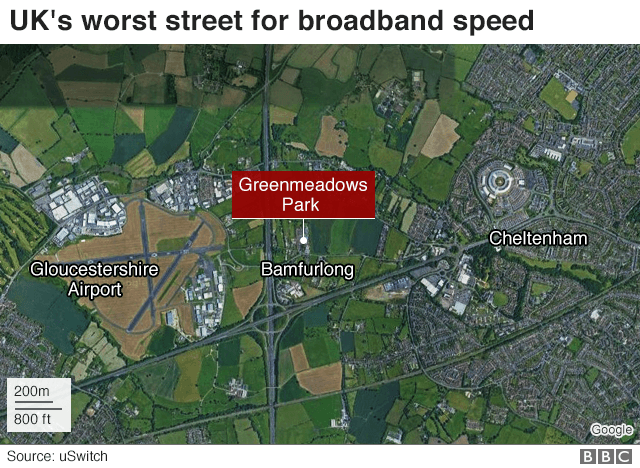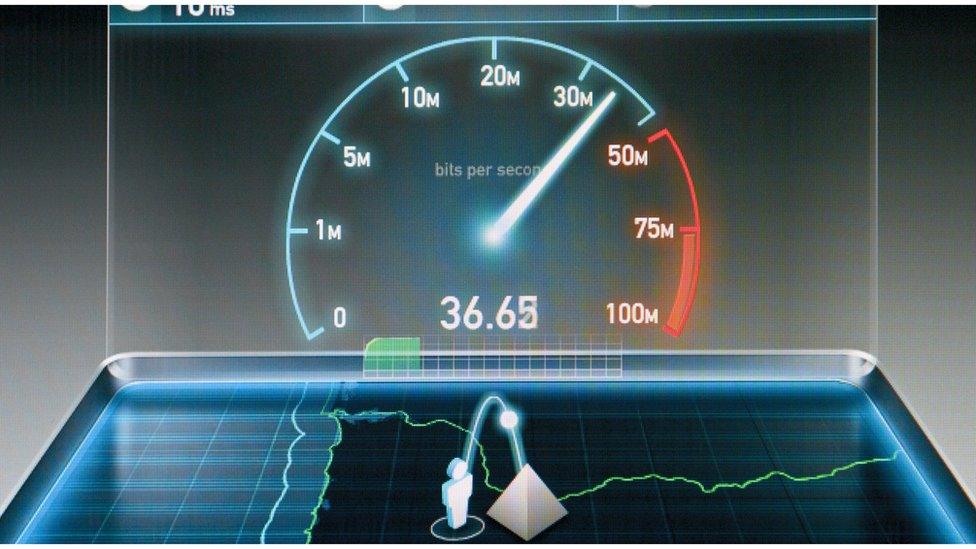Streets with UK's slowest and fastest broadband named
- Published
- comments

One in eight homes had download speeds below 5Mbps, according to uSwitch
A village street in Bamfurlong, Gloucestershire, has been named as the slowest for broadband internet, according to an annual survey.
The study said homes on Greenmeadows Park averaged just 0.14 megabits per second (Mbps).
The fastest spot, by contrast, is said to offer speeds that are nearly 1,900 times faster.
It was named as Abdon Avenue in Birmingham, where the average speed was recorded as being 265.89Mbps.
For the sake of comparison, those figures suggest it would take users five minutes 42 seconds to download all five episodes of Sir David Attenborough's Dynasties series in high definition in Abdon Avenue, but more than seven days in Greenmeadows Park.
Of note, the Gloucestershire street is only about one mile (1.6km) away from GCHQ, the communications-focussed intelligence agency, which has some of the fastest internet access of all.

The research was carried out by the price comparison service uSwitch, which said it was based on more than 279,000 real-world speed tests by members of the public.
However, the team behind a rival service has criticised the company's methodology, and it appears that Greenmeadows Park's residents do have access to much faster speeds.
The government has promised homes and businesses will have a legal right to a minimum of 10Mbps from 2020.
'Postcode lottery'
USwitch said its results suggested the average speed in the UK was now 46.2Mbps, but added that about 13% of homes had speeds below 5Mbps.
Five of the country's fastest streets were found to be in the South West - in Devon, Dorset, Cornwall and Wiltshire.
Meanwhile, nine of the slowest streets were said to be in areas north of the River Mersey - including North Yorkshire, South Yorkshire, Greater Manchester, Merseyside and Scotland.
In some cases the firm said it was a "postcode lottery" as to whether users had abnormally fast or slow access, but in others it said there were ways to get a better service, such as moving to a "full-fibre" connection.

"Over a third of the slowest streets have access to superfast speeds, so people living there have no need to be crawling along on completely unusable internet services," said spokeswoman Dani Warner.
Greenmeadows Park residents may be among those who are unaware of the choices on offer.
A property on sale in the street is currently advertised as offering speeds of "up to 2Mbps", while BT's own speed-checker claims they stretch "up to 3.5Mbps".
But Gloucestershire County Council has tweeted that the rural broadband provider Gigaclear also offers an "ultrafast" gigabit service.
Allow X content?
This article contains content provided by X. We ask for your permission before anything is loaded, as they may be using cookies and other technologies. You may want to read X’s cookie policy, external and privacy policy, external before accepting. To view this content choose ‘accept and continue’.
'Misleading results'
Thinkbroadband uses crowdsourced data to create its own map of the country, external.
It has reviewed some of uSwitch's findings and suggests they contain anomalies as well as being misleading.
It says some streets' speeds have been recorded as being faster than any local service could provide, while others appear to be very slow despite speedy fibre-to-the-premises connections being on offer.
"They need to distinguish between slow streets and streets that are slow because no-one has upgraded," commented Thinkbroadbrand's editor Andrew Ferguson.
"Essentially the study is great PR for uSwitch's website but is poorly researched," he said.
Even so, he acknowledged the publication served as a reminder to customers to check if faster broadband had become available since they had signed up to their current deal.
And he added that households with slow connections should also check if they would be better served by switching to a 4G-based connection now that several of the networks were offering "unlimited data" deals.
- Published11 December 2018

- Published26 November 2018

- Published6 October 2017
